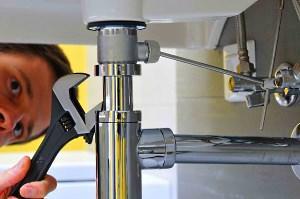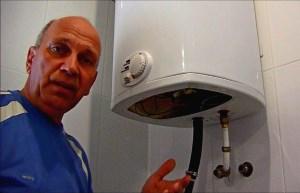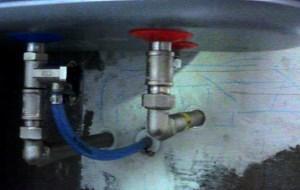What to do if the boiler is leaking?
 Almost every house or apartment, especially not provided with central hot water supply, has an individual boiler. This is a water heater, like everything in our world can fail. We will try to help you, we will tell you what to do if the boiler is leaking.
Almost every house or apartment, especially not provided with central hot water supply, has an individual boiler. This is a water heater, like everything in our world can fail. We will try to help you, we will tell you what to do if the boiler is leaking.
We define our capabilities
If you have never been involved in repairing equipment and have not held a screwdriver in your hands, then it is better to naturally turn to qualified plumbers.
But if you can repair a crane in your apartment or even your own car, then sometimes you have the opportunity to deal with this problem yourself. We warn you right away, although the water heater is quite simple in design, special knowledge is required for its repair, both in electrical engineering and in the field of thermal devices. Sometimes there were cases when the master, having properly repaired the electric water heater made a mistake in connecting it to the heating circuit and caused the entire system to malfunction.
We determine the possibility of self-repair in case of leakage

Finding the causes of leaks
The simplest option (and practically the only one) is visual inspection.
 No hydraulic test, no other methods are almost never applied to household and especially electric water heaters. Therefore, we determine the causes of leaks at the boiler visually. Here you can give one little advice - ordinary water is poorly visible, add a bright food coloring to it, then the places where it leaves the container will be clearly visible.
No hydraulic test, no other methods are almost never applied to household and especially electric water heaters. Therefore, we determine the causes of leaks at the boiler visually. Here you can give one little advice - ordinary water is poorly visible, add a bright food coloring to it, then the places where it leaves the container will be clearly visible.
True, there is one more small nuance, if the boiler flows from above, then this leak is possibly due to a malfunction of either the shut-off valves or valves that ensure the safety of the boiler, or the creation of excess pressure in its tank. In any case, such a malfunction of a water heater must be treated with special attention. If the boiler leaks from the bottom, then most likely this is caused by a defect in its capacity (especially for storage boilers).
If it is not possible to locate the leak visually, it is advisable to use the same method as for boilers or pressure vessels (if the design of the water heater allows it). In this case, an increased pressure is applied (by air) and the places where the boiler is leaking are detected after soaping (with soap or other surfactants dissolved in water).
Elimination of water leakage in the boiler
 Having found a place where water passes, you can begin to eliminate the leak. Most often, the problem area is the seals. First of all, you need to pay attention to the place where heating elements enter the boiler tank, often replacing this gasket can eliminate the whole problem.
Having found a place where water passes, you can begin to eliminate the leak. Most often, the problem area is the seals. First of all, you need to pay attention to the place where heating elements enter the boiler tank, often replacing this gasket can eliminate the whole problem.
Also, an electric boiler often flows through the places of installation or input of sensor communication lines. Moreover, it is advisable to use not the first seals that came to hand for the repair, namely those that are recommended by the company, manufacturer and preferably with its trademark. If this is not possible, then use heat-resistant rubber or paronite.
If the container is damaged, it must be repaired. It is difficult to tell which way to choose in this case. For steel, of course, welding is needed if possible, but if the pressures are not prohibitive (ordinary household boiler), then you can limit yourself to soldering. For aluminum (or more correctly duralumin), welding is required in a neutral environment (using a neutral gas like argon), so it is often easier to seal the crack with epoxy polymer. But if there is an opportunity, you should always give preference to welding.
It is also worth noting that small leaks necessarily turn into huge ones over time.
Therefore, even if a few drops per day seep from your boiler, be sure to find and eliminate the cause. Then the repair can be much more expensive.